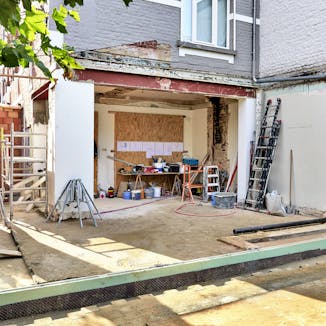Check your eligibility for a £60,000 loan, see the latest rates and get a quote without impacting your credit score.
Get a decision within an hour
Quote won’t affect your credit score
Poor credit & arrears accepted







These products are only available via a broker and can't be applied for directly
We're on a mission to improve the finances of the nation by helping you to spend wisely and save money



We're on a mission to improve the finances of the nation by helping you to spend wisely and save money



By Matt Fernell, Editor at Finance.co.uk.

A £60,000 loan is a big commitment, but it could help you renovate your home or clear expensive debts. Here’s what you need to know to find a £60,000 loan that works for you.
To help you find the right loan, we’ll check your eligibility with a range of top lenders in minutes - without affecting your credit score.
Get a decision within an hour
Compare quotes from a range of trusted lenders
Poor credit history accepted
Quotes tailored to you
We can give you a decision within an hour and be in touch with quotes for £60,000 loans; we just need to know about:
The loan term you want
Your finances
Your personal details
We’ll then compare the latest rates from the UK’s leading lenders to find the lowest rate loan available to you.
The criteria will differ from lender to lender, but to be eligible for a £60k loan, you will need to be:
A UK resident
At least 18 years old
Able to prove you have a steady income and can afford the repayments
£60,000 loans are generally only available as secured loans, which means you’ll need to be a homeowner to qualify. Here's everything you need to know about how secured loans work.
By performing a ‘soft check’ on your credit record, we will only ever show you loan rates you are eligible for.
When you apply for a £60,000 loan, you may be asked what you want the money for. This is usually only to help you get the right deal, and you can use the money however you like, including:
Paying for home improvements
Making an expensive purchase like a new car
Paying for a major event like a wedding
However, there may be certain restrictions and things providers won’t lend for, including:
Gambling or high-risk investments
Purchases of property or land
Timeshares
Getting a large loan is a big commitment, so it’s important to be sure you need it before applying.
To understand how much your £60k loan will cost, you need to know the interest rate (APR) and the term of the loan.
For example, if you had a £60,000 loan over 5 years with an APR of 9.5%, you would need to repay £1,248.70 each month. In total, you would repay £74,922.14, so the overall cost of the loan would be £14,922.14 in interest over the 5 years.
If you increase the term of the loan, you can reduce your monthly payments, but this means you pay more interest overall.
For example, a £60,000 loan over 10 years would have monthly repayments of only £763.63, but the total repayable amount would be £91,635.12. So, the overall cost in interest would more than double to £31,635.12.
Most lenders don’t offer personal loans for more than £25,000, so it’s unlikely you will be able to find an unsecured loan for £60,000.
Unsecured loans are considered more risky to lenders because there is no security if you’re unable to make your repayments. For this reason, most loan providers don’t offer large unsecured loans.
However, you may be able to find a specialist lender willing to offer a £60k loan on an unsecured basis, but you will need to have an excellent credit record and strong income.
It’s worth remembering that personal loans usually have a higher interest rate than secured loans, so you will pay more in interest over the term of the loan.
The information provided does not constitute financial advice, it’s always important to do your own research to ensure a financial product is right for your circumstances. If you’re unsure you should contact an independent financial advisor.
APR is short for Annual Percentage Rate, and it shows the overall cost of your loan.
Any extra fees or charges are added to the loan amount before APR is calculated.
It's a legal requirement for credit lenders to show their APR so an easy and fair comparison of interest rates can be made between lenders.
If you don’t think you’ll be able to repay your loan, contact the lender as soon as possible. They could be able to help by working out a new repayment plan you can afford or authorising a payment holiday to give you some time to get your finances back on track.
If you miss your repayments without telling your lender, you will probably face late payment fees and interest. It will also harm your credit rating and could put your home at risk if you have a secured loan.
It is possible to get a £60,000 loan if you have a poor credit history, but you may have less choice or face higher interest rates.
Lenders are usually more willing to offer secured loans if you have bad credit because using your home as collateral reduces their risk.
However, any loan will come with a higher interest rate when you have a poor credit rating and, therefore, be more expensive. Find out more about getting a loan with bad credit here.
If you’re struggling with bad credit and trying to manage your borrowing, a debt consolidation loan could help. This type of loan is used to pay off your expensive debts and consolidate them into one affordable repayment.
With some lenders, you could borrow £60,000 over as little as one year or up to 25 years.
When working out the loan term, remember that a shorter term will mean you’ll pay less interest overall, but your monthly repayments will be higher. That’s why you should try to work out the maximum you can afford to repay each month to get the shortest term possible.
Once approved, it should only take a few days to receive the money; however, the application for a secured loan can be much longer than for an unsecured loan.
This is because you will need to provide more documentation, including mortgage statements and proof of home ownership. The lender may also want to conduct their own valuation of your property.
You can get a secured loan with a fixed or variable interest rate. Getting a loan with a fixed interest rate means your repayments will stay the same for the loan's lifetime.
A variable interest rate, however, can go up or down depending on external factors like the Bank of England base rate. This can make it harder to budget, but variable-rate loans often don’t have any early repayment charges, which means you could pay the loan back early without paying a fee.
Which option is best for you depends on your attitude to risk and what level of flexibility you want with your repayments.